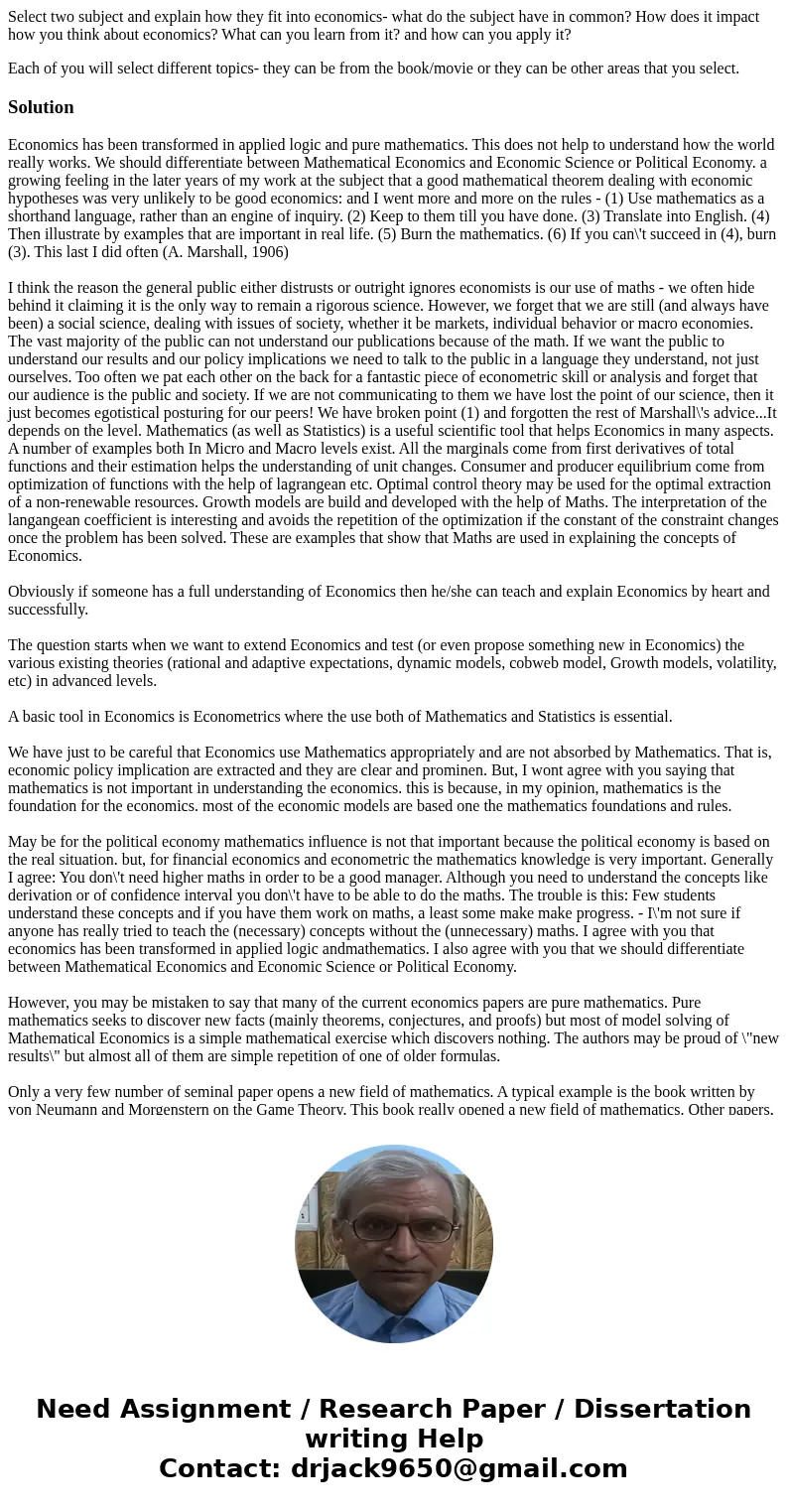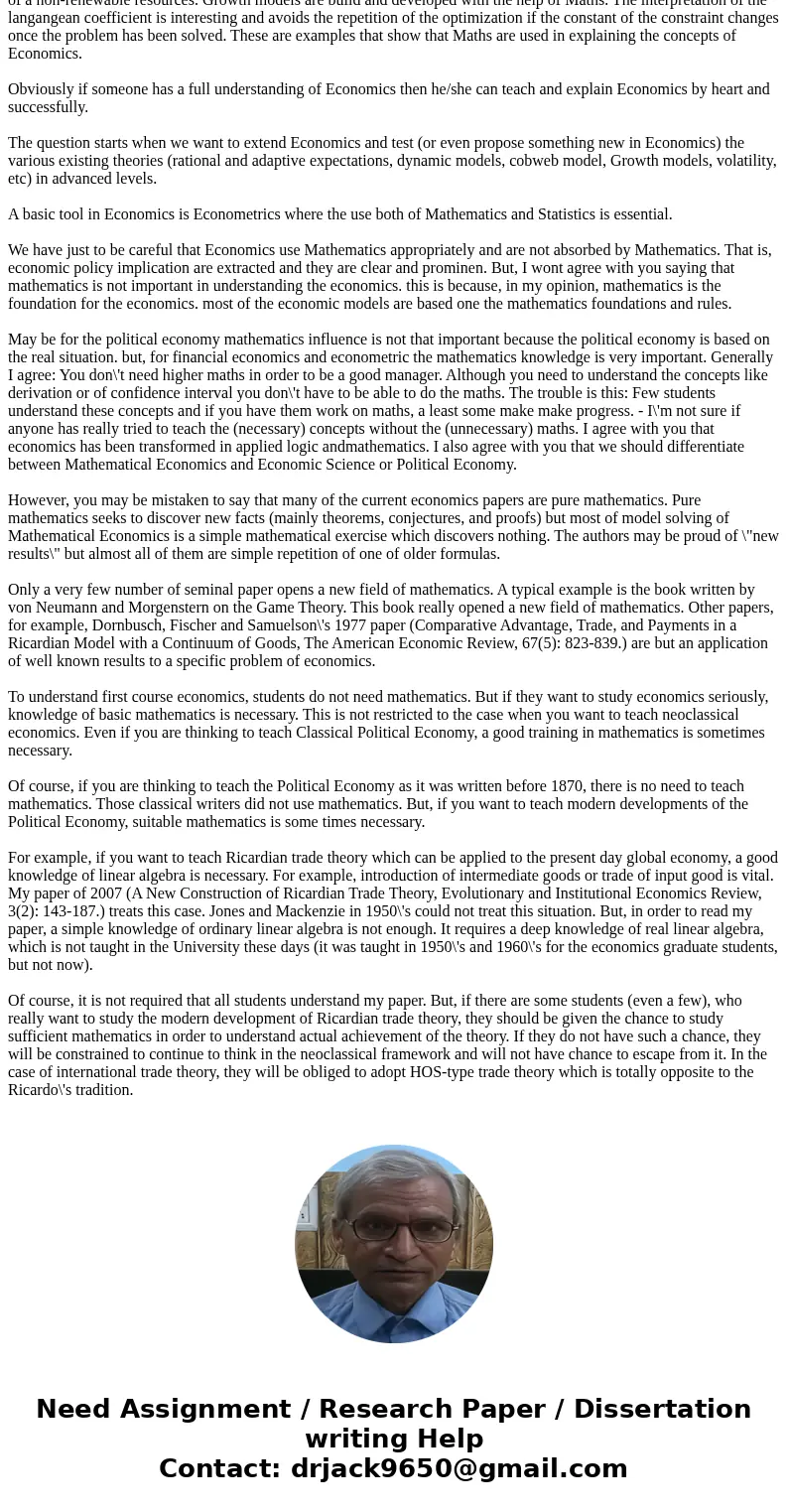Select two subject and explain how they fit into economics w
Select two subject and explain how they fit into economics- what do the subject have in common? How does it impact how you think about economics? What can you learn from it? and how can you apply it?
Each of you will select different topics- they can be from the book/movie or they can be other areas that you select.
Solution
Economics has been transformed in applied logic and pure mathematics. This does not help to understand how the world really works. We should differentiate between Mathematical Economics and Economic Science or Political Economy. a growing feeling in the later years of my work at the subject that a good mathematical theorem dealing with economic hypotheses was very unlikely to be good economics: and I went more and more on the rules - (1) Use mathematics as a shorthand language, rather than an engine of inquiry. (2) Keep to them till you have done. (3) Translate into English. (4) Then illustrate by examples that are important in real life. (5) Burn the mathematics. (6) If you can\'t succeed in (4), burn (3). This last I did often (A. Marshall, 1906)
I think the reason the general public either distrusts or outright ignores economists is our use of maths - we often hide behind it claiming it is the only way to remain a rigorous science. However, we forget that we are still (and always have been) a social science, dealing with issues of society, whether it be markets, individual behavior or macro economies. The vast majority of the public can not understand our publications because of the math. If we want the public to understand our results and our policy implications we need to talk to the public in a language they understand, not just ourselves. Too often we pat each other on the back for a fantastic piece of econometric skill or analysis and forget that our audience is the public and society. If we are not communicating to them we have lost the point of our science, then it just becomes egotistical posturing for our peers! We have broken point (1) and forgotten the rest of Marshall\'s advice...It depends on the level. Mathematics (as well as Statistics) is a useful scientific tool that helps Economics in many aspects. A number of examples both In Micro and Macro levels exist. All the marginals come from first derivatives of total functions and their estimation helps the understanding of unit changes. Consumer and producer equilibrium come from optimization of functions with the help of lagrangean etc. Optimal control theory may be used for the optimal extraction of a non-renewable resources. Growth models are build and developed with the help of Maths. The interpretation of the langangean coefficient is interesting and avoids the repetition of the optimization if the constant of the constraint changes once the problem has been solved. These are examples that show that Maths are used in explaining the concepts of Economics.
Obviously if someone has a full understanding of Economics then he/she can teach and explain Economics by heart and successfully.
The question starts when we want to extend Economics and test (or even propose something new in Economics) the various existing theories (rational and adaptive expectations, dynamic models, cobweb model, Growth models, volatility, etc) in advanced levels.
A basic tool in Economics is Econometrics where the use both of Mathematics and Statistics is essential.
We have just to be careful that Economics use Mathematics appropriately and are not absorbed by Mathematics. That is, economic policy implication are extracted and they are clear and prominen. But, I wont agree with you saying that mathematics is not important in understanding the economics. this is because, in my opinion, mathematics is the foundation for the economics. most of the economic models are based one the mathematics foundations and rules.
May be for the political economy mathematics influence is not that important because the political economy is based on the real situation. but, for financial economics and econometric the mathematics knowledge is very important. Generally I agree: You don\'t need higher maths in order to be a good manager. Although you need to understand the concepts like derivation or of confidence interval you don\'t have to be able to do the maths. The trouble is this: Few students understand these concepts and if you have them work on maths, a least some make make progress. - I\'m not sure if anyone has really tried to teach the (necessary) concepts without the (unnecessary) maths. I agree with you that economics has been transformed in applied logic andmathematics. I also agree with you that we should differentiate between Mathematical Economics and Economic Science or Political Economy.
However, you may be mistaken to say that many of the current economics papers are pure mathematics. Pure mathematics seeks to discover new facts (mainly theorems, conjectures, and proofs) but most of model solving of Mathematical Economics is a simple mathematical exercise which discovers nothing. The authors may be proud of \"new results\" but almost all of them are simple repetition of one of older formulas.
Only a very few number of seminal paper opens a new field of mathematics. A typical example is the book written by von Neumann and Morgenstern on the Game Theory. This book really opened a new field of mathematics. Other papers, for example, Dornbusch, Fischer and Samuelson\'s 1977 paper (Comparative Advantage, Trade, and Payments in a Ricardian Model with a Continuum of Goods, The American Economic Review, 67(5): 823-839.) are but an application of well known results to a specific problem of economics.
To understand first course economics, students do not need mathematics. But if they want to study economics seriously, knowledge of basic mathematics is necessary. This is not restricted to the case when you want to teach neoclassical economics. Even if you are thinking to teach Classical Political Economy, a good training in mathematics is sometimes necessary.
Of course, if you are thinking to teach the Political Economy as it was written before 1870, there is no need to teach mathematics. Those classical writers did not use mathematics. But, if you want to teach modern developments of the Political Economy, suitable mathematics is some times necessary.
For example, if you want to teach Ricardian trade theory which can be applied to the present day global economy, a good knowledge of linear algebra is necessary. For example, introduction of intermediate goods or trade of input good is vital. My paper of 2007 (A New Construction of Ricardian Trade Theory, Evolutionary and Institutional Economics Review, 3(2): 143-187.) treats this case. Jones and Mackenzie in 1950\'s could not treat this situation. But, in order to read my paper, a simple knowledge of ordinary linear algebra is not enough. It requires a deep knowledge of real linear algebra, which is not taught in the University these days (it was taught in 1950\'s and 1960\'s for the economics graduate students, but not now).
Of course, it is not required that all students understand my paper. But, if there are some students (even a few), who really want to study the modern development of Ricardian trade theory, they should be given the chance to study sufficient mathematics in order to understand actual achievement of the theory. If they do not have such a chance, they will be constrained to continue to think in the neoclassical framework and will not have chance to escape from it. In the case of international trade theory, they will be obliged to adopt HOS-type trade theory which is totally opposite to the Ricardo\'s tradition.


 Homework Sourse
Homework Sourse